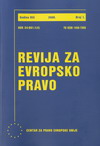MEĐUNARODNA PRAVNA POMOĆ U EU U OBLASTI IZVOĐENJA DOKAZA U GRAĐANSKIM I TRGOVAČKIM STVARIMA
INTERNATIONAL LEGAL AID IN THE EU IN OBTAINING EVIDENCES IN CIVIL AND COMMERCIAL MATTERS
Author(s): Božidar JeličićSubject(s): Law, Constitution, Jurisprudence, Civil Law, International Law, Commercial Law
Published by: Удружење за европско право - Центар за право Европске уније
Keywords: international legal aid; obtaining evidence; the courts cooperation; disclosure of judicial requests; the EU Council Regulation 1206/2001, the 1970 Hague Convention
Summary/Abstract: Council Regulation (EC) no. 1206/2001, from 28th May 2001, regulated the question of cooperation between the courts of the EU member states, in acquiring evidence in Civil and Commercial Matters. It represents the part of the effort of the member states, to organise the question of mutual international legal assistance, in a way that will correspond to the entire integration trend of the EU, on the economic, as well as the broader social and political level. Until the adoption of the Council Regulation 1206/2001, the issue of obtaining evidence between member states, in civil litigation with an international element, was regulated by the Hague Convention from 1970, regarding obtaining evidence in Civil and Commercial Matters, or on the basis of bilateral agreements. The method it entailed was complex and time-consuming, thus proving to be inadequate for the requests of the European Union as a community with a strong international dynamic. The direction, as well as the consequences of the integration trends, demanded more effective standards for the realisation of the mutual cooperation of member states in this area. The answer to this demand is the Council Regulation no. 1206/2001, which established faster and more efficient mechanisms in this segment of international legal assistance. Their efficiency is founded on the simplified and direct contact between the courts of member states; the standardization of the form of communication by adopting special forms that must be used; the employment of modern communication technologies, as well as the possibility of directly obtaining evidence on the territory of the other member state.
Journal: Revija za evropsko pravo
- Issue Year: 10/2008
- Issue No: 2-3
- Page Range: 29-39
- Page Count: 11
- Language: Serbian

